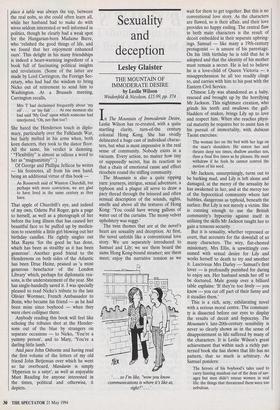Sexuality and deception
Lesley Glaister
THE MOUNTAIN OF IMMODERATE DESIRE by Leslie Wilson Weidenfeld & Nicolson, £15.99, pp. 374 In The Mountain of Immoderate Desire, Leslie Wilson has re-created, with a quite startling clarity, turn-of-the century colonial Hong Kong. She has vividly delineated a huge cast of individual charac- ters, but what is most impressive is the real sense of community. Nobody exists in a vacuum. Every action, no matter how tiny or supposedly secret, has its reaction so that a chain of emotional cause and effect ricochets round the stifling community.
The Mountain is also a quite ripping yarn: journeys, intrigue, sexual adventure, a typhoon and a plague all serve to draw a pacy thread through the leisured and often sensual description of the sounds, sights, smells and above all the textures of Hong Kong: 'You could have wrung gallons of water out of the curtains. The mossy velvet upholstery was soggy.'
The twin themes that are at the novel's heart are sexuality and deception. At first, the novel unfolds like a conventional love story. We are separately introduced to Samuel and Lily; we see them board the same Hong Kong-bound steamer; see them meet; enjoy the narrative tension as we . . . so I'm like, "wow you know communications is where it's like at, right?" . . wait for them to get together. But this is no conventional love story. As the characters are flawed, so is their affair, and their love provides no happy ending. The central flaw in both main characters is the result of deceit embedded in their separate upbring- ings. Samuel — like many a 19th-century protagonist — is unsure of his parentage. On his 16th birthday he is told that he is adopted and that the identity of his mother must remain a secret. He is led to believe he is a love-child of Queen Victoria — a misapprehension he all too readily clings to, and carries with him to his post with the Eastern Civil Service.
Chinese Lily was abandoned as a baby, rescued and brought up by the horrifying Mr Jackson. This nightmare creation, who grinds his teeth and swallows the gall- bladders of snakes, brings Lily up to love and respect him. When she reaches physi- cal maturity he requires her to assist him in his pursuit of immortality, with dubious Taoist exercises:
The woman lies on the bed with her legs on the man's shoulders. He enters her and thrusts deep ten times, shallow another ten, then a final five times as he pleases. He must withdraw if he feels he cannot control the motion of his seed.
Mr Jackson, unsurprisingly, turns out to be barking mad, and Lily is left alone and damaged, at the mercy of the sexuality he has awakened in her, and at the mercy too of the hypocritical community where lust bubbles, dangerous as typhoid, beneath the surface. But Lily is not merely a victim. She is cunning enough to use the British community's hypocrisy against itself in utilising the skills Mr Jackson taught her to gain a tenuous security.
But it is sexuality, whether repressed or overt, that accounts for the downfall of so many characters. The wiry, flat-chested missionary, Mrs Ellis, is unwittingly con- sumed with sexual desire for Lily and works herself to death to try and smother it. Lascivious Mrs Darley — Samuel's first lover — is profoundly punished for daring to enjoy sex. Her husband sends her off to be doctored. Male gossip over a billiard table explains: 'If they're too lively — you know — you cut off part of their fanny and it steadies them.'
This is a rich, sexy, exhilarating novel with a serious moral centre. The communi- ty is dissected before our eyes to display the results of deceit and hypocrisy. The Mountain's late-20th-century sensibility is never so clearly shown as in the sense of disappointment in life suffered by many of the characters. It is Leslie Wilson's great achievement that within such a richly pat- terned book she has shown that life has no pattern, that so much is arbitrary. As Samuel ponders:
The heroes of his boyhood's tales used to carry fainting maidens out of the dens of sav- ages but men didn't rescue women in real life: the things that threatened them were too nebulous.




































































 Previous page
Previous page